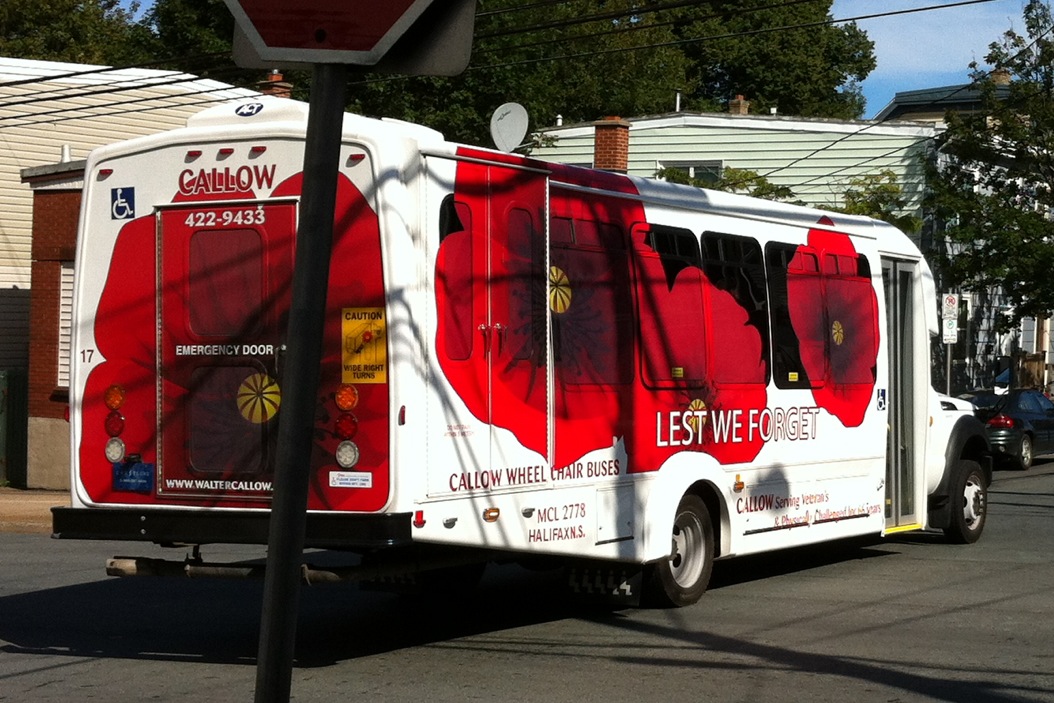Walter Harris Callow on:
[Wikipedia]
[Google]
[Amazon]
Walter Harris Callow (1896–1958) was a Canadian veteran who invented the accessibility bus for veterans returning from WW2 and others in
 As a member of the
As a member of the
Wheelchair bus service turns 65, founder lauded
Chronicle Herald. 29 July 2012
The Achievement of Walter Callow. Montreal Gazette. 26 February 1953
Wheelchair bus service turns 65, founder lauded. Chronicle Herald
* Walter Callow. ''A Challenge: Will You Help? Walter Callow's Veterans and Invalids Club.'' Halifax : Wm. Macnab & Son, 1947
Lethbridge Herald. Caring and Courage. 25 November 1752, p. 9Montreal Gazette 22 March 1955
{{DEFAULTSORT:Callow, Walter People from Cumberland County, Nova Scotia Canadian blind people People with tetraplegia Canadian amputees 20th-century Canadian inventors Military history of Nova Scotia 1896 births 1958 deaths Canadian disability rights activists Sustainable transport pioneers Blind activists Canadian activists with disabilities
wheelchairs
A wheelchair is a mobilized form of chair using two or more wheels, a footrest, and an armrest usually cushioned. It is used when walking is difficult or impossible to do due to illnesses, injury, disabilities, or age-related health conditions ...
(1947). He designed and managed the Walter Callow Wheelchair Bus, while he himself was blind, quadriplegic
Tetraplegia, also known as quadriplegia, is defined as the dysfunction or loss of Motor control, motor and/or Sense, sensory function in the Cervical vertebrae, cervical area of the spinal cord. A loss of motor function can present as either weak ...
and, eventually had both legs amputated. Callow planned trips for disabled veterans, tours of the countryside, picnics, sporting events, art classes and other activities. He was born in Parrsboro, Nova Scotia and became a resident of the Camp Hill Military Hospital for twenty years.
Biography
 As a member of the
As a member of the Royal Flying Corps
The Royal Flying Corps (RFC) was the air arm of the British Army before and during the First World War until it merged with the Royal Naval Air Service on 1 April 1918 to form the Royal Air Force. During the early part of the war, the RFC sup ...
in Camp Mohawk, Ontario, Callow crashed in a test flight in 1918. He received a serious back injury and a heart condition. He continued on in a lumber business in Advocate, Nova Scotia. He eventually became bed-ridden in 1931 because of his injuries, the same year his mother and wife died and left him with a young child. He continued business by selling real-estate.
In 1937 Callow became a full-time resident of the Camp Hill Hospital and two years later he was blind and quadriplegic. While at the Hospital he established a board of directors and hired two secretaries. He established the Callow Cigarette Fund to send cigarettes to soldiers serving over-seas during World War II.
After the war, he turned his cigarette fund into a wheelchair coach service for disabled veterans (1947). He started by having two custom-made buses built in Pubnico, Nova Scotia; five subsequent buses were built by Prevost, and smaller models by others followed. He named the company the "Callow Veterans' and Invalids' Welfare League" and established an office in Halifax. He worked tirelessly to make facilities accessible and to make visible the needs of those with physical disabilities. The Walter Callow bus system operated throughout Nova Scotia until 2019, and a single Callow bus operated out of Lethbridge, Alberta between 1954 and 1969.
Walter Harris Callow's funeral was conducted in Halifax with full military honours. The only time that Callow had the opportunity to ride on his bus is when his body was returned to Advocate to be buried.
Legacy
There was an unveiling of the Walter Callow Memorial Plaque at the Advocate cemetery on 10 August 2001. The Walter Callow Wheelchair Bus ceased operations in 2018.Chronicle Herald. 29 July 2012
See also
*Military history of Nova Scotia
Nova Scotia (also known as Mi'kma'ki and Acadia) is a Canadian province located in Canada's Maritimes. The region was initially occupied by Mi'kmaq. The colonial history of Nova Scotia includes the present-day Maritime Provinces and the northern ...
* List of people with quadriplegia
* Wheelchair accessible van
A wheelchair-accessible van is a vehicle that has been modified by increasing the interior size of the vehicle and equipping it with a means of wheelchair entry, such as a wheelchair ramp or powered lift.
Modifications
The general steps manufa ...
References
Endnotes TextsThe Achievement of Walter Callow. Montreal Gazette. 26 February 1953
Wheelchair bus service turns 65, founder lauded. Chronicle Herald
* Walter Callow. ''A Challenge: Will You Help? Walter Callow's Veterans and Invalids Club.'' Halifax : Wm. Macnab & Son, 1947
Lethbridge Herald. Caring and Courage. 25 November 1752, p. 9
{{DEFAULTSORT:Callow, Walter People from Cumberland County, Nova Scotia Canadian blind people People with tetraplegia Canadian amputees 20th-century Canadian inventors Military history of Nova Scotia 1896 births 1958 deaths Canadian disability rights activists Sustainable transport pioneers Blind activists Canadian activists with disabilities